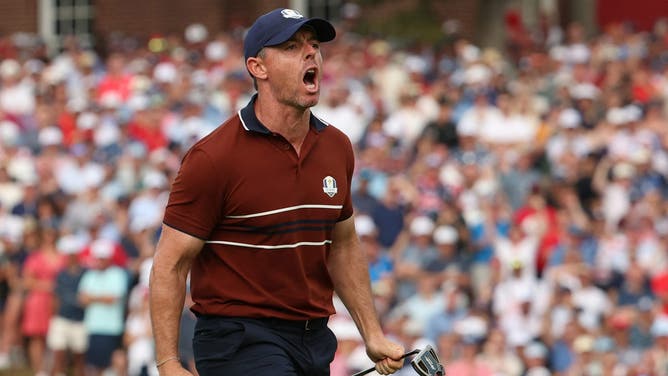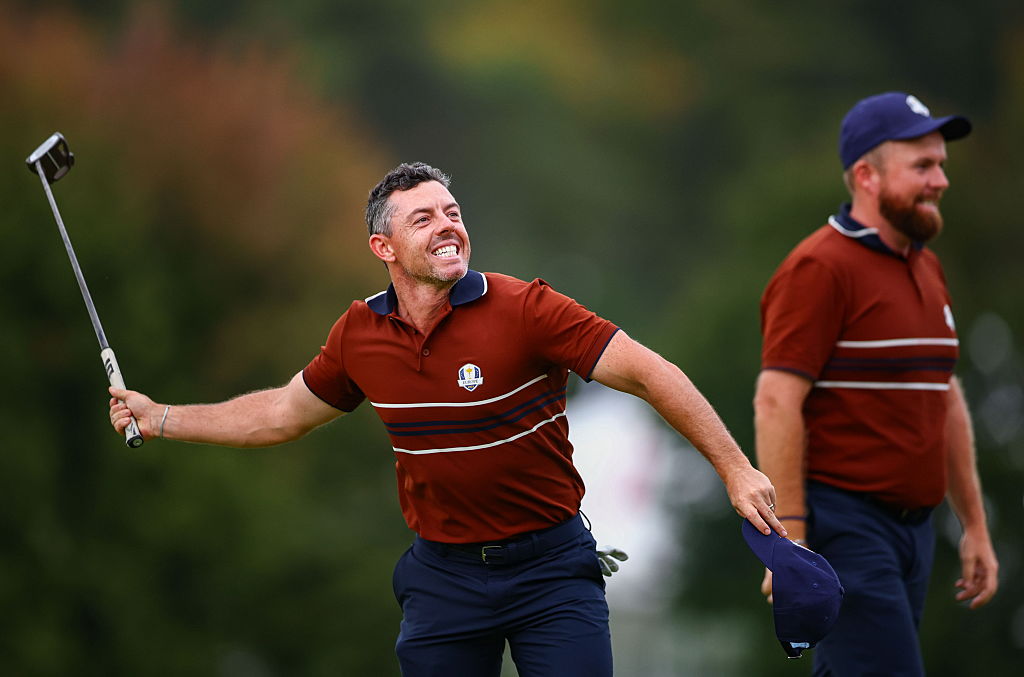The “European” Ryder Cup team won the 2025 event at Bethpage Black over the weekend, highlighting the inaccuracy of several narratives pushed by golf media and fans. It also demonstrated to the world how hypocritical team leader Rory McIlroy is when it comes to appropriate behavior on and around a golf course.
McIlroy is perhaps the clearest example of the inaccuracy of preferred narratives around one of golf’s biggest events. He responded to swearing and aggressive, inappropriate comments from fans by swearing back and acting inappropriately himself, then draped the European flag over a display of Bryson DeChambeau’s name. All while lecturing in his press conference about how people should behave on golf courses.
RELATED: Rory McIlroy May Have Given The Most-Hypocritical Press Conference In Sports History After Ryder Cup
But hypocrisy, unprofessional behavior and golf media letting him get away with it isn’t where McIlroy gains his on-course advantage in the Ryder Cup. That comes down to geography.

Sep 27, 2025; Bethpage, New York, USA; Team Europe’s Rory McIlroy celebrates after holing his putt on the 14th hole during the four-balls on the second day of competition for the Ryder Cup at Bethpage Black. Mandatory Credit: Brendan Mcdermid-Reuters via Imagn Images
Europe Benefits From Living In Both Places
One of the most commonly repeated phrases in the lead up to the Ryder Cup and during the event was the difficulty of winning an “away” competition. Whether or not that’s true, or a simple product of the random variance inherent in small sample-size sporting competitions is a separate discussion.
But what is undoubtedly true is that the 2025 Ryder Cup in New York was not an “away” match, by any stretch of the imagination, for a European team where the majority of the team lives, whether full or part-time, in the United States.
Before going in depth on what that means for their roster, here’s a list of team Europe:
Rory McIlroy – lives in Jupiter, FLJon Rahm – lives in Scottsdale, AZJustin Rose – has a house in FloridaTommy Fleetwood – lives in Dubai, has a house in Orlando, FLViktor Hovland – lives in Florida, went to Oklahoma StateLudvig Aberg – lives in Florida, went to Texas TechSepp Straka – Moved to Georgia when he was 14Matt Fitzpatrick – has a house in FloridaTyrrell Hatton – has a house in FloridaShane Lowry – lives in Jupiter, FLRasmus Højgaard – has a house in Florida
Notice anything? For example, that all of the players listed, literally all of them, have a house or live full time in the United States. It’s even a running joke among US fans.
That’s not to criticize them for it, it’s obvious why they would live in the US. European golfers play the vast majority of their competitive golf in the US, and the US has far better coaching, training, facilities and climate for playing or practicing golf year round. But that pays dividends when it comes to the Ryder Cup. How? Because it takes away what should be an advantage for the US team at domestic events, while retaining their advantage for tournaments played in Europe.
Tommy Fleetwood, for example, recently played Bethpage for fun with YouTube golfer Grant Horvat. For those that have houses in Florida, there was no need to worry about jet lag or adjusting to the Eastern Time Zone. Excluding Rahm, virtually the entire team could stay in their own homes before taking a short flight to New York. That means Bethpage wasn’t an “away” competition, because, despite what people think, what makes sporting events home or away is lack of familiarity.
Even better for Team Europe, on top of limiting the US team’s benefits, they retain that home “field” advantage when playing in Europe. Why? Well, because they grow up playing on the European tour, building familiarity with golf in the UK or the continent. Many also have homes in the UK, making it easy to adjust to the European time zones ahead of say, the 2027 Ryder Cup in Ireland.
For US players, the overwhelming majority will play one event per year overseas: The Open Championship. Scottie Scheffler, for example, has spent roughly 20 days of his life involved in competitive golf in the UK. Even if he or others play an extra event here or there, it pales in comparison to the European golfers’ experience in the US.
Crowd Noise Doesn’t Actually Matter Much
What about the crowds though, wouldn’t the partisan US supporters in New York provide the actual “home” advantage? Nope. Not even a little bit.
There have been several studies over the past decade that examined the influence of crowd noise on “home field advantage” in sports. In fact, there’s even a book about it, called “Scorecasting,” written by researchers at the University of Chicago. Turns out crowds have little to do with home field benefits.
“Some observers cite the noise made by home fans in explaining home-team advantage. That seems particularly the case in stadiums such as Century Link Field, home of the Seattle Seahawks. There, on December 3, 2013, in a game against the New Orleans Saints, the crowd roared at 137.6 decibels (dB), breaking the world record for the loudest outdoor sports stadium. (For reference, physical pain begins for humans who listen to sounds measuring 125 dB, and a jet flying overhead at a height of only 100 ft. hits about 140 dB.) But even taking into account crowd noise, Moskowitz and Wertheim [study authors] were unable to find persuasive evidence that crowds on their own do anything to affect player performance,” as one summary explained.
We also conducted a natural experiment on this during COVID shutdowns. For the first time, sporting events were held in empty stadiums. And sure enough, the lack of fans did not impact home field advantage. In fact, as one study found, soccer teams in Italtty actually won a higher percentage of home matches without fans. So what does that leave as an explanation for consistently higher winning percentages at home across virtually all sports? Familiarity.
“It’s hard to imagine that fatigue is too much of a factor anymore, especially not in elite sport,” that study’s author said. “With the absence of fans not affecting results much either, that leaves familiarity.”
Well, well, well. What is the advantage Europeans have playing golf in the US over American players playing in Europe? Familiarity.
Familiarity with the courses, with the time zone, with the travel conditions, with things as important as the type of grass they’re playing on. Again, Tommy Fleetwood played Bethpage for fun on YouTube. Scottie Scheffler or Xander Schauffele won’t be filming YouTube content at Adare Manor anytime soon.
Does this excuse the US’ performance? Of course not. The course setup was a disaster, as even captain Keegan Bradley admitted. There were questionable pairings that seemed, from the outside, to make little sense. They even made mistakes with how they sent out pairings. As just one example, Russell Henley played the odd holes in his match with Scottie Scheffler on Friday. But the odd holes at Bethpage favored longer hitters like Scheffler. On Saturday, Bradley sent out Scheffler and DeChambeau together, instead of separating his two best players to maximize their odds of taking a valuable point. They lost their match anyway.
Meanwhile, the “European” players knew exactly how to play their shots at Bethpage. They knew how to play out of the rough, thanks to years of experience golfing in similar conditions. They knew exactly how the ball would react on the greens. They knew how to hit bunker shots. Because they were familiar with all of it. That’s not an “away” match, it’s creating a nearly level playing field. And it’s why Europe disproportionately wins the Ryder Cup.
Despite what golf media claims, Europe doesn’t win more because they “care” or having better leadership. Leadership doesn’t explain Justin Rose making every putt, nor does caring. Because if he could decide to care more and as a result, play better, why did he play so poorly on Sunday in singles? Why did he play so poorly for the vast majority of the 2025 season? If European golfers can turn on extra skill by exerting more effort, why don’t they win more majors? Why did Jon Rahm, Fleetwood, and McIlroy all lose their matches on Sunday, if they could simply decide that winning the Cup mattered more to them, thanks to superior team leadership? Why did the US win in 2021 at Whistling Straights by the largest margin in modern Ryder Cup history? Even with many of the same Europeans, like Rahm, Fleetwood, McIlroy, Fitzpatrick, Lowry, Hovland and Hatton on that team?
Living and playing in the US doesn’t guarantee Team Europe a “road” win. They still have to hit quality golf shots, make putts, and overcome the US team setting up the course to their players’ advantage. But when those US captains fail to maximize course setup, which is exactly what happened at Bethpage, those marginal win expectancy gains are erased.
We focus on the wrong things in sports, because emotional narratives are appealing. Humans don’t like accepting randomness as an explanation for events, even partially. We separate things into “clutch” and “choking” because it’s easier and more exciting. That doesn’t change the reality. And the reality is that the US team will always struggle in this event more than it should. Because unlike Europe, they don’t actually have a home field advantage.







